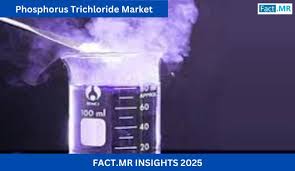Phosphorus Trichloride Market is Forecasted to Reach USD 2.52 Billion by 2035 | Fact.MR Analysis

Analysis of Phosphorus Trichloride Market Covering 30+ Countries Including Analysis of US, Canada, UK, Germany, France, Nordics, GCC countries
ROCKVILLE, MD, UNITED STATES, June 27, 2025 /EINPresswire.com/ -- The global Phosphorus Trichloride Market, valued at USD 1.79 billion in 2024, is set for steady growth over the next decade, reaching an estimated USD 2.52 billion by 2035, according to a comprehensive analysis by Fact.MR. The market is projected to expand at a compound annual growth rate (CAGR) of 3.2% from 2025 to 2035, driven by increasing demand for agrochemicals, particularly herbicides and pesticides, and its critical role as a chemical intermediate in pharmaceuticals and flame retardants.For More Insights into the Market, Request a Sample of this Report: https://www.factmr.com/connectus/sample?flag=S&rep_id=7363
Essential Role of Phosphorus Trichloride
Phosphorus trichloride (PCl₃) is a versatile chemical compound widely used as an intermediate in the synthesis of various phosphorus-based chemicals. Its applications span multiple industries, including agrochemicals (herbicides, pesticides), pharmaceuticals (drug intermediates), flame retardants, plasticizers, and organophosphorus compounds. PCl₃’s reactivity and ability to form organophosphorus derivatives make it indispensable for producing high-value chemicals like phosphorus oxychloride, phosphites, and phosphates.
Fact.MR’s report highlights that the Phosphorus Trichloride Market is pivotal in supporting global agricultural productivity and industrial chemical synthesis. Its role in producing glyphosate, a widely used herbicide, and flame-retardant additives for plastics and textiles underscores its importance in addressing food security and safety requirements across industries.
Key Drivers of the Phosphorus Trichloride Market
Several factors are propelling the growth of the Phosphorus Trichloride Market, as outlined in Fact.MR’s analysis:
Rising Demand for Agrochemicals: The global agriculture sector’s need for herbicides and pesticides, particularly glyphosate, is a primary driver of the Phosphorus Trichloride Market. With the global population projected to reach 8.5 billion by 2030, increasing food production demands are boosting agrochemical consumption, particularly in Asia-Pacific and Latin America.
Pharmaceutical Industry Growth: PCl₃ is a critical intermediate in synthesizing active pharmaceutical ingredients (APIs) and drug intermediates. The expanding pharmaceutical industry, driven by rising healthcare needs and biologics development, is fueling demand for phosphorus trichloride in drug manufacturing.
Flame Retardant Applications: The growing use of flame-retardant materials in construction, electronics, and textiles is driving demand for PCl₃-based compounds like phosphonates and phosphates. Stringent fire safety regulations, such as those enforced by the National Fire Protection Association (NFPA), are supporting the Phosphorus Trichloride Market.
Industrial Chemical Synthesis: PCl₃’s role as a precursor in producing phosphorus oxychloride, phosphites, and other organophosphorus compounds is driving its use in industries like plastics, lubricants, and water treatment, contributing to the Phosphorus Trichloride Market growth.
Sustainability Trends: The development of eco-friendly phosphorus-based chemicals, driven by regulatory pressures and environmental concerns, is encouraging innovation in PCl₃ applications, particularly in green chemistry and sustainable agrochemicals.
Market Segmentation and Trends
Fact.MR’s report segments the Phosphorus Trichloride Market by grade, application, and region, providing insights into key trends:
By Grade: Pure-grade PCl₃ dominates the market, accounting for a significant share due to its use in high-purity applications like pharmaceuticals and electronics. Technical-grade PCl₃ is widely used in agrochemicals and industrial applications, driven by cost-effectiveness.
By Application: Agrochemicals lead the Phosphorus Trichloride Market, with herbicides like glyphosate accounting for a major share. Flame retardants and pharmaceuticals are also significant, with growing demand for phosphonates in construction and APIs in drug development. Other applications include plasticizers and water treatment chemicals.
By Region: Asia-Pacific holds the largest share of the Phosphorus Trichloride Market, driven by robust agricultural and industrial activities in China, India, and Southeast Asia. North America and Europe are key markets due to their established pharmaceutical and chemical industries, while Latin America is emerging as a growth hub due to agrochemical demand.
Get Customization on this Report for Specific Research Solutions: https://www.factmr.com/connectus/sample?flag=S&rep_id=7363
Emerging Trends in the Phosphorus Trichloride Market
The Phosphorus Trichloride Market is evolving with several notable trends:
Focus on Sustainable Agrochemicals: The shift toward eco-friendly herbicides and pesticides, driven by regulatory restrictions on toxic chemicals, is boosting demand for PCl₃ in green agrochemical formulations.
Advancements in Flame Retardants: Innovations in non-halogenated, phosphorus-based flame retardants are gaining traction, particularly in electronics and construction, supporting the Phosphorus Trichloride Market.
Pharmaceutical Innovations: The increasing use of PCl₃ in synthesizing complex APIs and biologics is driving market growth, particularly in precision medicine and oncology.
Competitive Landscape
The Phosphorus Trichloride Market is moderately consolidated, with key players like BASF SE, Lanxess AG, Excel Industries, Solvay, and Merck KGaA leading the market. These companies are focusing on capacity expansions, product innovations, and strategic partnerships to strengthen their positions. For instance, Excel Industries’ focus on agrochemical intermediates and Solvay’s advancements in phosphorus-based chemicals are driving market competitiveness. Regional players in Asia-Pacific, such as Xuzhou Jianping Chemical Co., Ltd., are also gaining traction through cost-effective production.
Challenges and Opportunities
The Phosphorus Trichloride Market faces challenges, including stringent environmental regulations due to PCl₃’s toxicity and corrosiveness, which require advanced safety and handling measures. Volatility in raw material prices, particularly phosphorus, and supply chain disruptions also pose risks.
However, these challenges are offset by significant opportunities:
Agrochemical Demand: The global push for agricultural productivity, especially in emerging markets, offers substantial growth potential for PCl₃ in herbicide and pesticide production.
Pharmaceutical Expansion: The rising demand for innovative therapies and biologics is creating new applications for PCl₃ in drug synthesis, boosting the Phosphorus Trichloride Market.
Eco-Friendly Innovations: The development of sustainable, phosphorus-based chemicals for flame retardants and agrochemicals aligns with global environmental goals, presenting growth opportunities.
Future Outlook
The Phosphorus Trichloride Market is projected to grow at a CAGR of 3.2% from 2025 to 2035, reaching USD 2.52 billion by 2035. Asia-Pacific will continue to dominate, driven by its agricultural and industrial growth, while North America and Europe will maintain significant shares due to their pharmaceutical and chemical sectors. As industries prioritize sustainability and innovation, companies investing in eco-friendly PCl₃ applications and regional expansion will shape the future of the Phosphorus Trichloride Market.
Check out More Related Studies Published by Fact.MR Research:
The global electronic grade phosphoric acid market is projected to reach US$ 2.85 billion by 2034
Ammonium Chloride Market is forecasted to reach US$ 2.1 billion by 2033
S. N. Jha
Fact.MR
+1 628-251-1583
email us here
Legal Disclaimer:
EIN Presswire provides this news content "as is" without warranty of any kind. We do not accept any responsibility or liability for the accuracy, content, images, videos, licenses, completeness, legality, or reliability of the information contained in this article. If you have any complaints or copyright issues related to this article, kindly contact the author above.
Hyperion Functional Medicine Brings Revolutionary Functional Oncology Care to Cancer Patients Across eNLC States
Republic Goldfields Inc. Announces Filing of Outstanding Financial Statements and Application for Revocation of CTO
Mitch Gould Featured on the Cover of The Executive Lens Magazine for Pioneering Retail Distribution Strategy
Więcej ważnych informacji
 Jedynka Newserii
Jedynka Newserii

 Jedynka Newserii
Jedynka Newserii

Handel

Komisja Europejska chce wprowadzić ujednolicone przepisy dotyczące wyrobów tytoniowych. Europosłowie mówią o kolejnej nadregulacji
Ministerstwo Zdrowia opracowało nowy projekt przepisów wprowadzających kolejne zakazy dotyczące wyrobów tytoniowych – całkowitą eliminację e-papierosów oraz zakaz aromatów w woreczkach nikotynowych. Najprawdopodobniej w ciągu kolejnych dwóch–trzech lat Polska będzie musiała implementować nową dyrektywę dotyczącą wszystkich produktów tytoniowych, nad którym niebawem ma rozpocząć prace Komisja Europejska. Europosłowie mówią o ryzyku chaosu legislacyjnego, nadregulacji i wskazują na zagrożenia związane z proponowaną podwyżką akcyzy.
Konsument
Za trzy miesiące ruszy w Polsce system kaucyjny. Wątpliwości budzą kwestie rozliczeń i podatków

Zaledwie trzy miesiące zostały do startu systemu kaucyjnego w Polsce. Kaucje obejmą szklane i plastikowe butelki oraz puszki z napojami. To duża zmiana dla producentów napojów, sklepów i konsumentów oraz pośredniczących w zbiórce operatorów systemów kaucyjnego. Na razie przepisy są na tyle niedoprecyzowane, że budzą wiele wątpliwości w kwestii rozliczania podatków czy rozliczeń z operatorami. Producenci będą musieli płacić podatek od niezwróconych butelek, co zwiększy ich koszty.
Transport
Rośnie skala agresji na polskich drogach. Problemem jest nie tylko nadmierna prędkość, ale też jazda na zderzaku

Za kilka dni zaczynają się wakacje, czyli statystycznie najniebezpieczniejszy czas na drogach. Wśród głównych przyczyn takich zdarzeń na prostych odcinkach drogi są nadmierna prędkość i jazda na zderzaku. Zarządca autostrady A4 Katowice–Kraków w ramach kampanii „Nie zderzakuj. Posłuchaj. Jedź bezpiecznie” zwraca uwagę na zjawisko agresji na polskich drogach i przypomina, że bezpieczeństwo zaczyna się od osobistych decyzji kierowcy.
Partner serwisu
Szkolenia

Akademia Newserii
Akademia Newserii to projekt, w ramach którego najlepsi polscy dziennikarze biznesowi, giełdowi oraz lifestylowi, a także szkoleniowcy z wieloletnim doświadczeniem dzielą się swoją wiedzą nt. pracy z mediami.









.gif)



